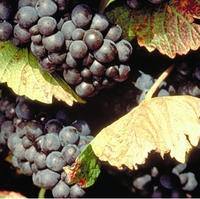
GRASP

Genomic Research-Assisted breeding for Sustainable Production of quality GRAPEs and WINE
ERA-NET Plant Genomics granted research project
Grapes are currently grown on 3.6 Million ha (2006) in Europe and amount to a total yearly production of 170 million hl (2006) in the European Union. Consumer concerns for improved food quality produced with environmentally safe and sustainable agriculture demands the development of new cultivars of table and wine grapes improved in fruit quality and natural pathogen resistance to reduce the current extensive use of fungicides. Breeding of grapevines is a long-lasting task and urgently requires the development of novel tools to achieve these aims efficiently and rapidly, also in order to face the consequences of Global Change.
In the last years there has been a growing amount of genomic information for grapevine. More than 350,000 EST sequences are stored in databases and the sequencing of the whole genome has been initiated. Deciphering the molecular determinants of phenotypic variation at those traits that are relevant in breeding is now the major challenge. The recent identification of more than 20,000 unigenes in Vitis allowed the development of microarray chips that are routinely being used to characterize the expression of 14,000 transcripts simultaneously. Genetic variation is available in cultivars of Vitis vinifera ssp. sativa as well as the European wild Vitis vinifera ssp. silvestris and American and Asian wild species of Vitis sp.
In a trilateral project
CoreGrapeGen
several of the participating groups collaborate to characterize and exploit the existent phenotypic and genotypic variation in grapevine collections corresponding to the species Vitis vinifera ssp. sativa, Vitis vinifera ssp. silvestris and various American and Asian species of the genus Vitis that are used as sources of resistance genes and as rootstocks. The data are used to generate selected core collections based on genotypic as well as on phenotypic diversity. These will be employed to study the extent of Linkage Disequilibrium in QTL-containing genomic regions and to perform genetic association studies with candidate genes.
The fundamental goal of this project is to combine genomic and quantitative genetical methods to identify the gene sequences and nucleotide variation responsible for phenotypic variation in resistance and berry quality traits in grape. Depending on the specific resources and topics of interest, the different collaborating research groups from France, Spain, Germany, Italy, Netherlands and Portugal will focus on specific strategies and traits. Targeted traits in wine and table grapes will include :
- berry size, fruit texture, seedlessness, acid/base balances, flavour compounds as well as
- fungal disease resistances (powdery and downy mildew diseases)
Duration: 01/01/2006 to 01/01/2009
Coordinator: Eva Zyprian
German coordinator : Eva Zyprian
| Laboratories | Address | Person | Contact |
| JKI | Institute of Grapevine Breeding, Geilweilerhof, Siebeldingen | Eva Zyprian, Reinhard Töpfer, Martina Rex, Ute Seitz | eva.zyprian[[at]]jki.bund.de |
| MPI Molecular Plant Physiology | Potsdam-Golm | Joachim Kopka, Alexander Erban | kopka[[at]]mpimp-golm.mpg.de |
French Coordinator : Charles Romieu
| Laboratory | Address | Person | Contact |
| INRA UMR-BEPC | INRA Montpellier | Charles Romieu, Laurent Torregrosa | romieu[[at]]ensam.inra.fr |
| INRA UMR 1097 | INRA Montpellier | Patrice This | this[[at]]ensam.inra.fr |
| INRA URGI | INRA Versailles | Nathalie Choisne, Delphine Steinbach, Hadi Quesneville | nathalie.choisne[[at]]versailles.inra.fr |
| INRA UMR-SVQV/INRA-ULP | INRA Colmar | Didier Merdinoglu, Eric DuchĂŞne | merdino[[at]]colmar.inra.fr |
| CNRS | Université de Bordeaux | Nathalie Ollat, Serge Delrot | ollat[[at]]bordeaux.inra.fr |
| VIVELYS | Villeneuve-lès-Maguelone, private partner | Nicolas Bernard | nicolas.bernard[[at]]vivelys.com |
Italian coordinator : Stella Grando
| Laboratory | Address | Person | Contact |
| IASMA | San Michele | Stella Grando, Riccardo Velasco | stella.grando[[at]]iasma.it |
Spanish coordinator : Jose Miguel Martinez-Zapater
| Laboratory | Address | Person | Contact |
| Centro Nacional de Biotecnologia | CSIC Madrid | Jose Miguel Martinez-Zapater | zapater[[at]]cnb.csic.es |
| IMIDA | La Alberca | Juan Carreno Espin, Pilar Hellin | juan.carreno[[at]]carm.es |
| ITUM | Blanca, private partne | Fausto Carrillo | nuevasuvas[[at]]terra.es |
Portuguese coordinator : Manuel Pedro Salema Fevereiro
| Laboratory | Address | Person | Contact |
| ITQB | Univ. Lisboa | Manuel Pedro Salema Fevereiro, Jorge Palva, Silvana Cardoso | psalema[[at]]itqb.unl.pt |
| ICAT | Portugal | Maria Salome Soares Pais, Ana Margarida Fortes | msalomepais[[at]]gmail.com |
| DBEB/CBAA | Instituto Superior de Agronomia | S.B.Q. Amancio | samport[[at]]isa.utl.pt |
| EVN | Estacao Vitivinicola Nacional | J.E.J. Eiras-Dias | evn.eiras.dias[[at]]mail.net4b.pt |
| PLANSEL Lda (JBP) | Montemor o Novo, private partner | Hans-Joerg Boehm | bohm[[at]]sapo.pt |
Dutch coordinator : Rob Verpoorte
| Laboratory | Address | Person | Contact |
| IBL | Leiden University | Rob Verpoorte, Kashif Ali | verpoort[[at]]chem.leidenuniv.nl |
Databases
| Genetic maps and QTL data | GnpMap |
| Transcriptomic data | GnpArray |
| Genetic resources and phenotypic data | SIReGal |
| Polymorphism data | GnpSNP |
| EST sequences data | GnpSeq |
| Genomic sequences annotations data | GnpGenome |
| Metabolomic data | GMD@CSB.DB |
Tools
| URGI shared area | Grasp directory with Alfresco

|
To share documents with other GRASP project members, use Alfresco, our web software of electronic documents management .
To access to the Alfresco tool :
- the first form is the secured web server authentification with the URGI login/password.
- the 2 nd form is Alfresco authentification with the Alfresco login/password.
The GRASP directory path is Compagny Home > Projects > GRASP.
To ask for an account on the URGI secure server, please complete the
form
To ask for an account on the Alfresco tool, please
contact us
Funding




Creation date: 26 Nov 2009
 eZ Publish
eZ PublishPublication supervisor: A-F. Adam-Blondon
Read Credits & General Terms of Use
Read How to cite








